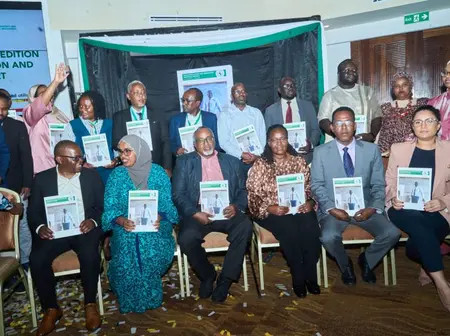The Intergovernmental Authority on Development (IGAD) has concluded a four-day regional workshop in Mombasa aimed at strengthening migration and displacement statistics to address the region’s growing migration challenges.
The 7th Migration Data Technical Working Group Workshop brought together experts from IGAD’s eight Member States and international partners to harmonize data collection methods, improve quality and comparability of migration statistics, and enhance evidence-based policymaking across the region.
“Our region continues to experience complex migration dynamics. To respond adequately, we must invest in stronger data systems that inform policies and ensure no one is left behind,” said Mohamed Abdi Ware, IGAD Deputy Executive Secretary, during the closing session.
The IGAD region remains one of the world’s most climate-vulnerable areas, where recurring droughts, floods, and desertification force people and livestock to move in search of water, pasture, and safety. These movements frequently cross national borders, complicating government responses and highlighting the urgent need for accurate, comparable data.
Djibouti’s representative, Oumalkaire Ahmed Hassan emphasized that migration is a shared regional challenge requiring coordinated action.
“Djibouti stands ready to work hand-in-hand with fellow IGAD member states to strengthen data systems,” she said. “Reliable, harmonized statistics will help us design policies that protect migrants and communities while fostering regional stability and integration.”
Delegates included representatives from National Statistical Offices, Immigration Departments, Ministries of Labour, Central Banks, and Foreign Affairs, as well as regional and international partners such as the African Union, IOM, ILO, UNECA, UNHCR, GIZ, and Statistics Sweden.
Key sessions reviewed member states’ progress in migration statistics, deliberated on strategies for data harmonization, and discussed draft guidelines to align national practices with international standards. The workshop also laid the groundwork for the third edition of the IGAD Migration Statistics Report, a key tool for regional planning and policy development.
“As a country that serves as a point of origin, transit, and destination, Kenya understands the importance of reliable data,” said Rosemary Bowen, Acting Director of Population Statistics at the Kenya National Bureau of Statistics (KNBS). “Stronger migration statistics will enable us to protect vulnerable groups, manage mobility more effectively, and support host communities.”
Organized by IGAD, in collaboration with Statistics Sweden, IOM, and GIZ, the workshop is expected to produce clear recommendations and an action plan to help countries integrate migration into national development plans and meet global commitments such as the Global Compact for Migration, the Global Compact on Refugees, and the UN Sustainable Development Goals.
With climate shocks, conflict, and economic pressures driving unprecedented levels of movement, strengthened migration data systems will play a crucial role in building resilience, safeguarding human dignity, and fostering regional cooperation across the Horn of Africa.

Leave a Reply